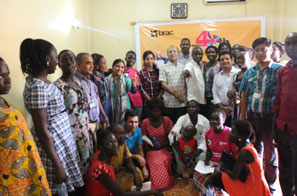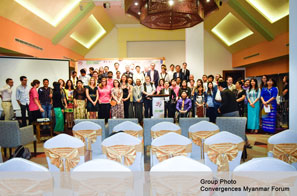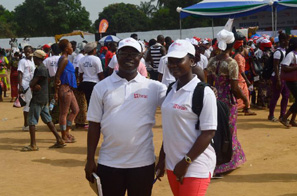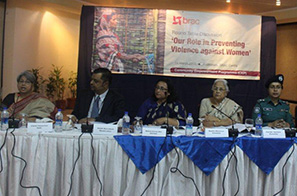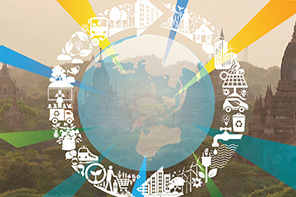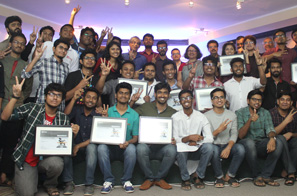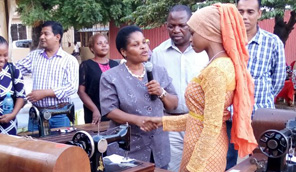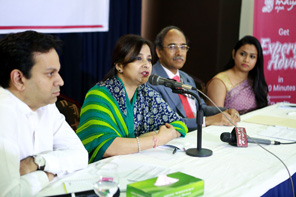
English (961)
Children categories
BRAC Day Celebration 2017
 BRAC in South Sudan team celebrating BRAC Day 2017
BRAC in South Sudan team celebrating BRAC Day 2017
On 21st March 2017, BRAC South Sudan joined together as one family for celebrations to mark 45 years of BRAC.
Staff discussed how BRAC not only transformed the lives of people positively, but has also inspired them to overcome challenges no matter their backgrounds. Some staffs were really excited to express their stories and motivation and use the hashtag #IamBRAC.
Country Representative Mr. Rezaul Karim expressed his honor at leading the South Sudan team and he appreciated the effort of all BRAC Staff to ensure the wellbeing of communities in South Sudan and Globally.
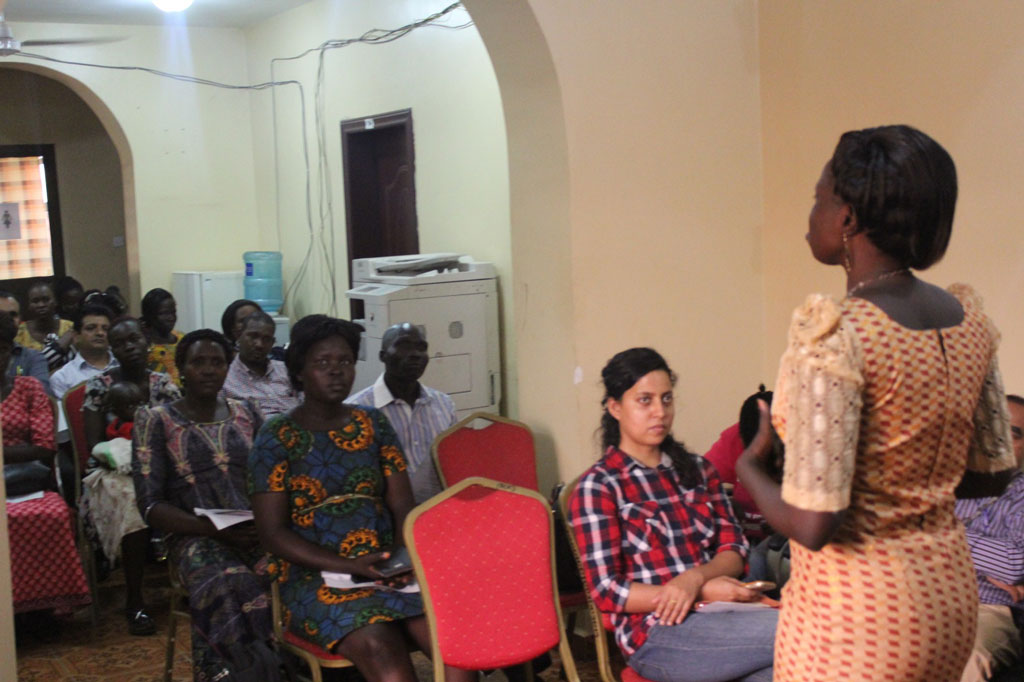 Reading out Chairperson's speech as part of BRAC Day 2017 celebrations
Reading out Chairperson's speech as part of BRAC Day 2017 celebrations
Convergences Myanmar Forum 2017
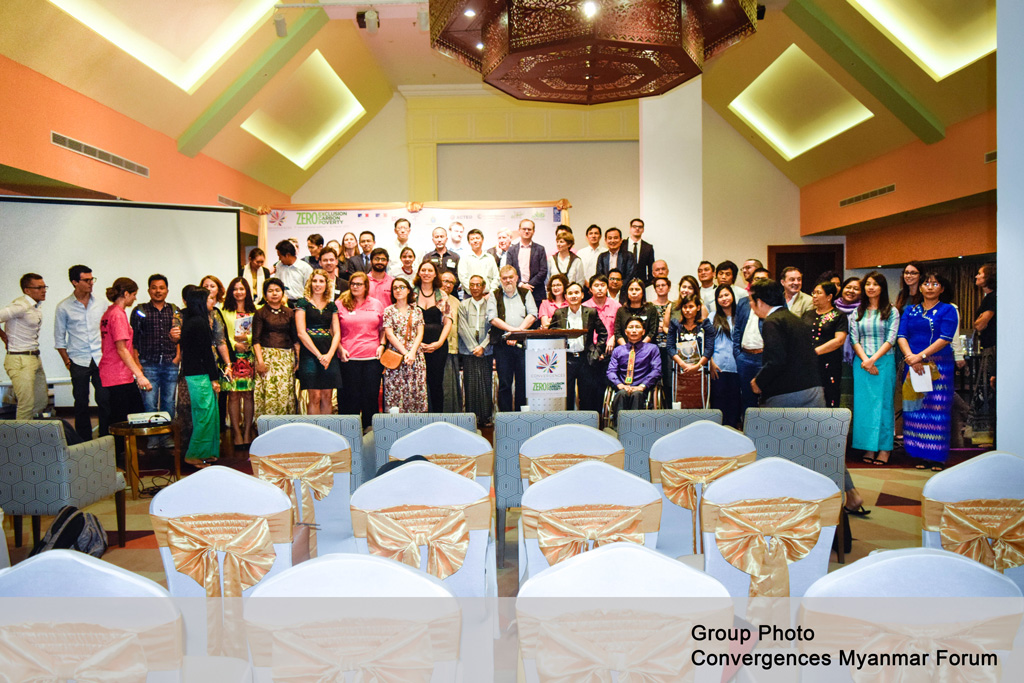
On the 10th of March BRAC Myanmar co-hosted a session on financial inclusion during the first edition of the Convergences Myanmar Forum. The theme of the session was ‘How to provide financial services for the poorest and most marginalised people?’ and the audience consisted of representatives from private organisations, NGOs and policy-makers. Lewis Temple, CEO of BRAC UK, presented BRACs ultra-poor graduation model as an illustration to the topic. Thereafter, panellists from Entrepreneurs du Monde, Dawn Myanmar, the Financial Regulatory Department, Wave Money and PGMF together with the audience discussed the challenges of reaching the poorest and how to overcome these. The speakers agreed that microcredit alone is not enough in order to reach the poorest - a more holistic approach is needed. Proposed solutions to overcome the challenges are to focus more on an integrated approach (training, support, skills development), to cooperate with and implement digital financial services and to facilitate information and knowledge sharing. All parties showed a great willingness and commitment throughout the session to cooperate toward a more financial inclusive Myanmar society.
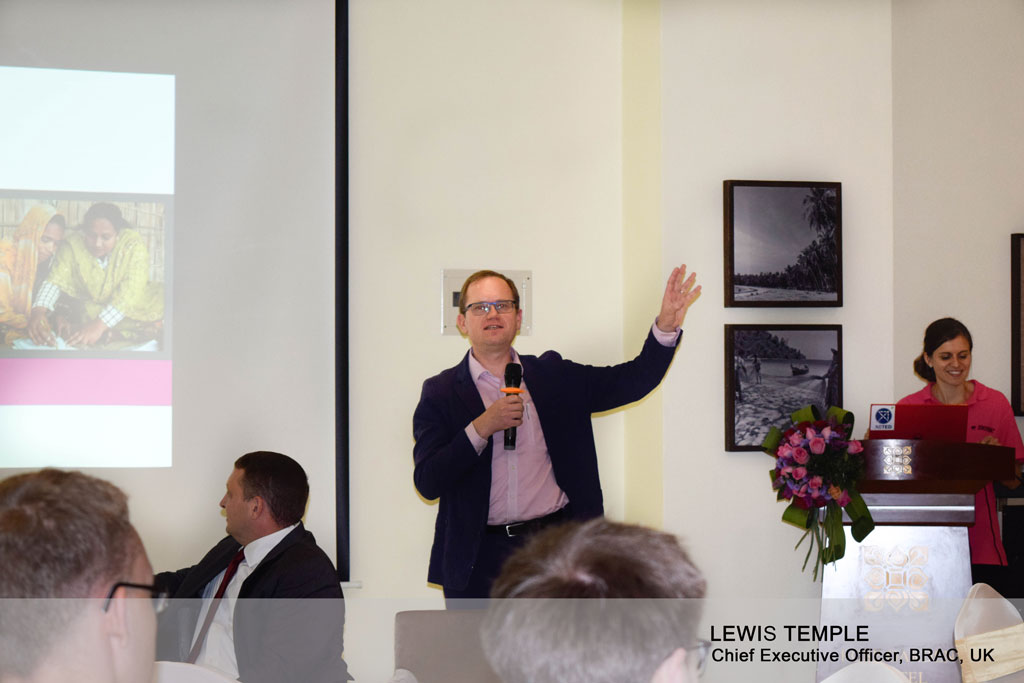
International Women's Day 2017 celebration
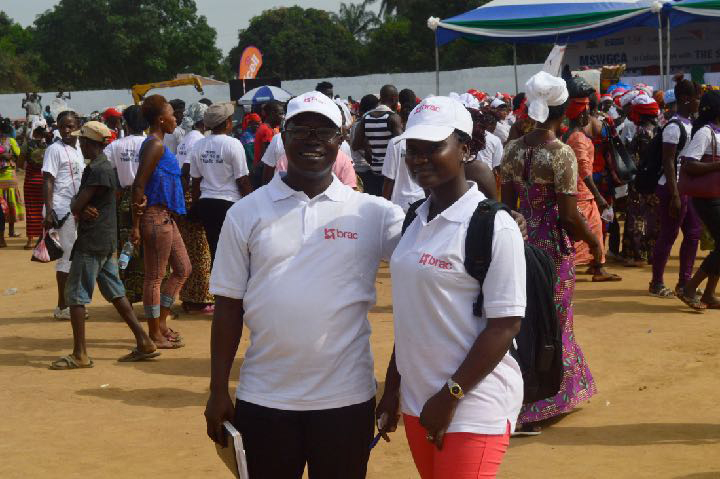 BRAC employees at the Sierra Leone national celebration of IWD 2017
BRAC employees at the Sierra Leone national celebration of IWD 2017
BRAC in Sierra Leone celebrated International Women's Day 2017 by organising an event celebrating the contributions of women at the workforce. All staff were in attendance and the there was a discussion around whether BRAC in Sierra Leone are really promoting gender mainstreaming. Going with this year's theme of "Be Bold for Change", the staff explored how BRAC is promoting women empowerment and enhancing the capacity of women and young girls for them to bring about desired change.
Members of BRAC in Sierra Leone also attended the national programme organised by the government of Sierra Leone through the ministry of Social Welfare, Gender and Children's Affairs.
7,489 incidents of violence against women in 2016
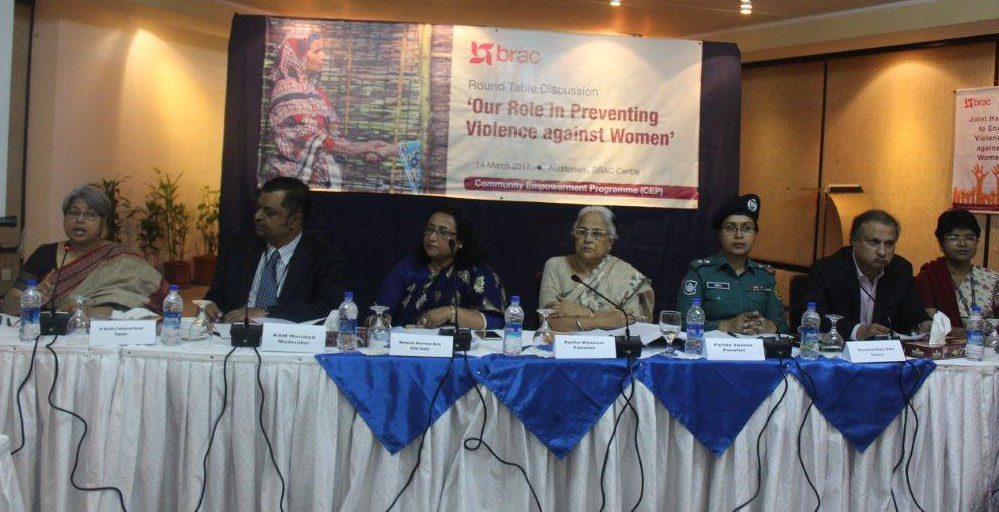
A total of 7,489 women and girls have been experienced multiple form of violence during January to December 2016. What is most alarming about the report is that the rate of child victims is 20 per cent of the total violence against women occurred during the period. Every day 1.7 child below the age of 18 have become victim of rape incidents.
BRAC community empowerment programme today organised a roundtable discussion at the BRAC Centre’s auditorium to share key findings of incidents of violence against women as documented by the programme.
Anna Minj, director of community empowerment, integrated development and gender, justice and diversity programme presided over the roundtable titled `Our Role in Preventing Violence against Women’. Mahmuda Sharmeen Benu, additional secretary of Ministry of Women and Children Affairs was the Chief Guest. Dr Ruchira Tabassum Naved, Senior Scientist of ICDDRB, Aysha Khanom, President of Bangladesh Mohila Parishad, Farida Yasmin, Deputy Commissioner, (Women Support and Investigation Unit, DMP, and Head of Victim Support Center), Mozammel Haque Babu, Chief Editor and Managing Director, 71 Television were panel discussants in the event. KAM Morshed, director, technology and partnership strengthening unit, moderated the roundtable.
Violence against women in different ways has been a common weapon to control women and this is becoming a common practice under patriarchal culture. The BRAC report shows that a total of 7,489 women and girls have been experienced violence last year. Every day on an average, 20 women and girls became victims of violence. Most frequently reported type of violence are (highest to lowest): physical violence (67 per cent), sexual (19 per cent) and mental/psychological (14 per cent). Most frequent form of violence is physical torture (4,344) of total reported incidence followed by rape and gang rape (874)), suicide (835), murder (481) and attempted rape (310). 82 per cent violence occurred in domestic sphere and 18 per cent in public sphere. Highest number of violence recorded in Jessore (351) followed by Satkhira (288), Narsingdi (280), Potuakhali (252), Mymensingh (248), Feni (220) and Rangpur (219) while the lowest was from Madaripur (34). Among all incidents, 26 per cent case filed, 7 per cent resolved in shalish and 39 per cent was under process and 28 per cent did not file any case or did not take any legal actions.
BRAC community empowerment program (CEP) identifies and reports incidents of violence against women from 55 districts of Bangladesh. This is done through its network of 12,350 ward-level and women-led institutions called Polli Shomaj. The victim or victims’ family, neighbours, and Polli Shomaj members send reports to BRAC head office, and maintain a database.
The Chief Guest, Mahmuda Sharmeen Benu said, “Violence against women is not only for the problem of women, it is also the problem of men as well. Need to work collaborately to end violence. Considering it, we have taken initiative to form `adolescent club’ in all Unions. We have also taken initiative to empower women in promoting entrepreneurship in 18 different businesses in 490 upazillas.”
Panel discussant Ayesha Khanam said, now different preventive initiative has been taking from GO and NGO but it is not sufficient considering the vulnerability. We need to work in a holistic approach to prevent violence. She also said that we have laws but most of the people, even those who are implementing, do not know about the law. She emphasised on proper implementation of the law.
Among others, government officials, representatives of law enforcing agencies, women and human rights activists, teachers, researchers, NGO activits, media representatives were present/took part in the discussion.
Convergences Myanmar Forum
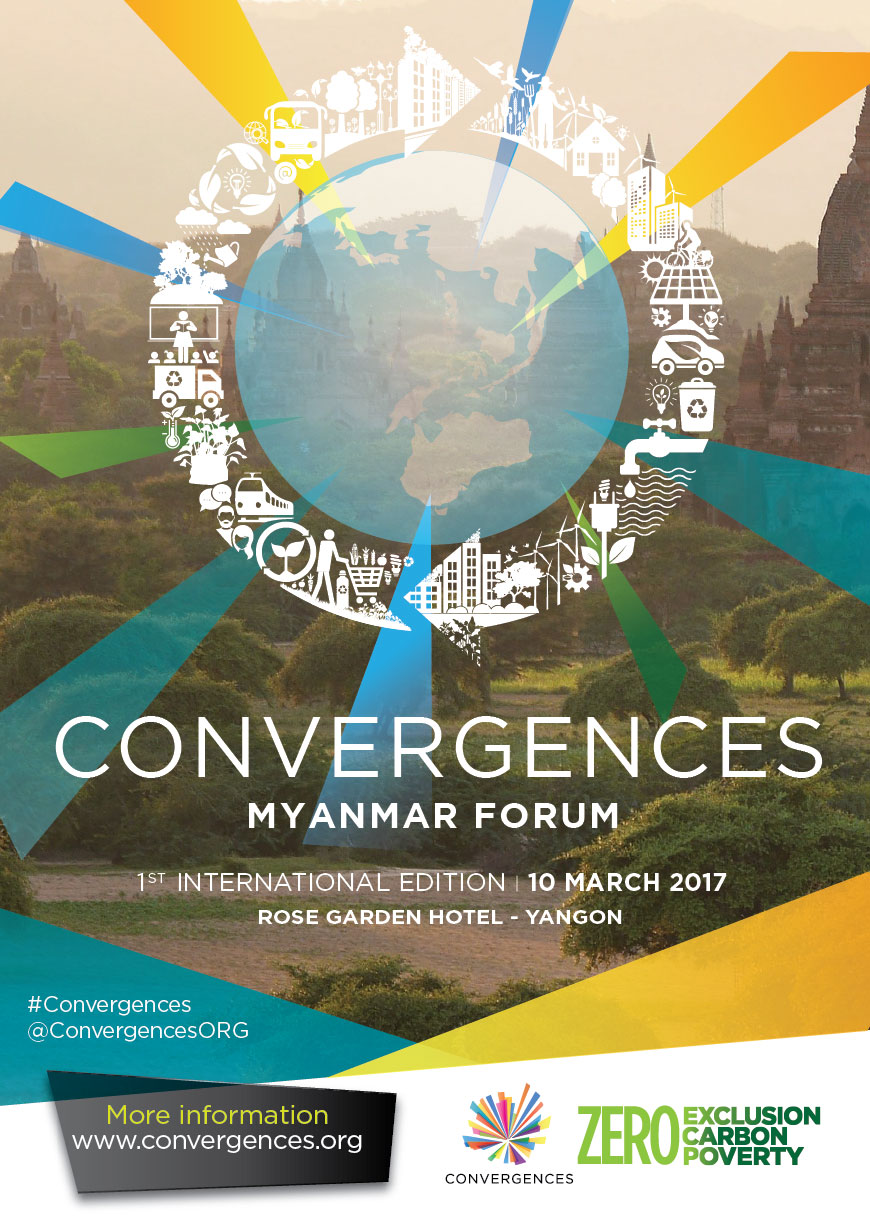
This one-day meeting will gather 200 experts and professionals, representing the public, private, academic, NGO and civil society sectors and aim at addressing four specific development challenges during solutions-oriented workshops. In each workshop, a multi-stakeholder panel will debate together and with the audience around potential solutions to achieve together a “Zero Exclusion, Zero Carbon, Zero Poverty” world, in the Myanmar context.
As a part of this day BRAC co-hosts a session about financial inclusion and poverty eradication in Myanmar. To this session we are happy to welcome Lewis Temple, CEO of BRAC UK, for a presentation on BRAC's Graduation Model as a tool for financial inclusion of the poorest. Following this presentation, a panel including regulators, Microfinance institution and a financial technology company will discuss the challenges and opportunities to down-scale financial inclusion in order to increase outreach.
For more information click here.
BRACathon: 11 groups awarded
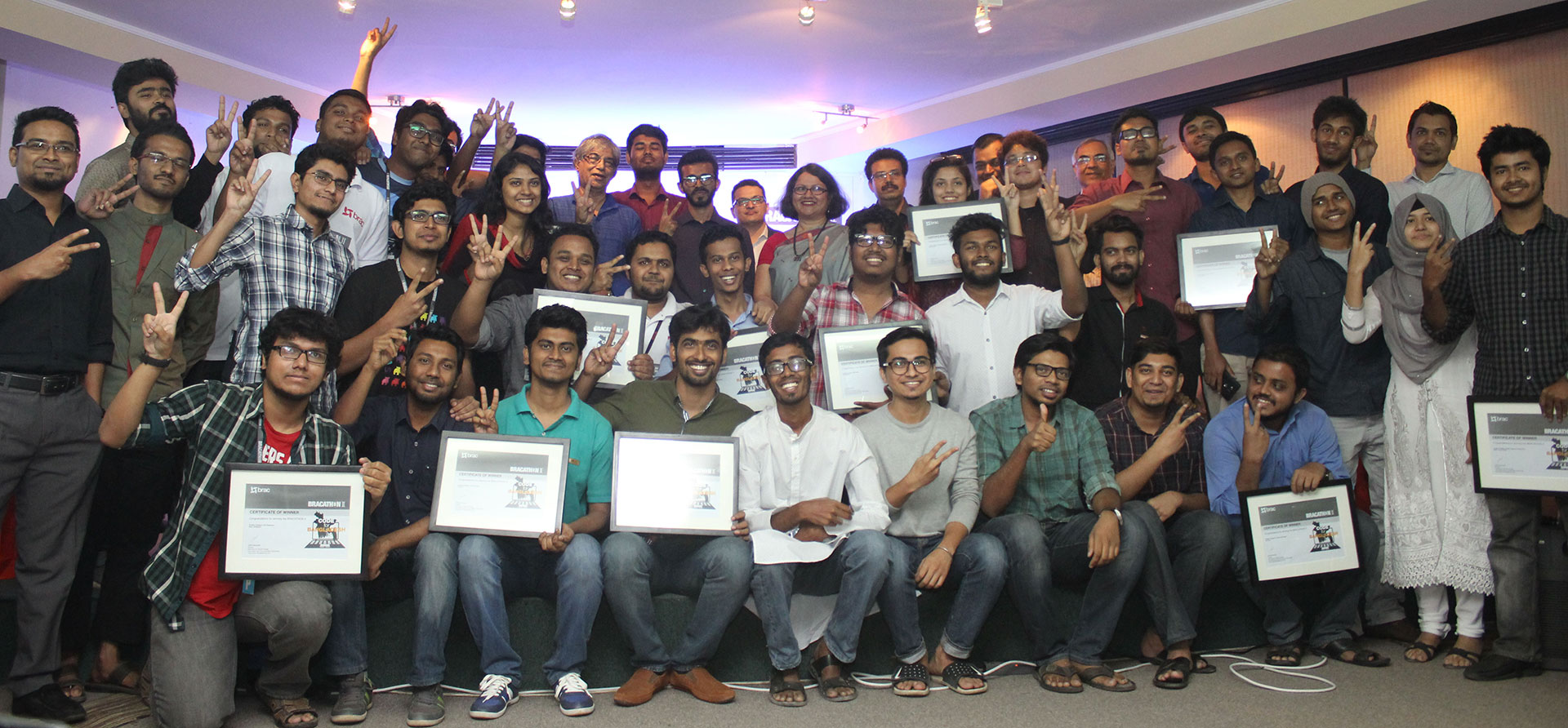 Winners of the competition
Winners of the competition
BRACathon, a competition for innovating mobile applications to solve different social and development issues concluded through an award ceremony today on Monday. Following are 11 groups that received awards in eight categories in the event:
Blue Screen of Death group in Networking in young apprentices category; Team AOS in E-commerce in enterprises category; Team Reboot in Milk Game category; Sust-Hexacore in Parental care category; Codex Unicorn in School monitoring tool category; BUET_COLD_STEEL in Water-logging in Dhaka city category; Buet_firefighters in Fire response category; and The Roar in Gender awareness category.
Distinguished guests presented the awards to the winners at a programme at BRAC Centre. Mustafa Jabbar, president, Bangladesh Association of Software and Information Services (BASIS), KAM Morshed, director, Advocacy for Social Change, ICT and Partnership Strengthening, BRAC, Debashish Saha, director, field operations, Plan International, Bangladesh, Sabina Faiz Rashid, dean and professor, James P Grant School of Public Health, BRAC University, were present, among others, at the ceremony.
Mustafa Jabbar said, ‘We have to solve our problems with our own efforts engaging the digital revolution. It’s no use depending on Canada or the US, so to speak, for the solution of our problems. There might be 160 millions of problems in our country of 160 millions. Our youths with their own innovative capacity are very much able to solve so many of our issues.’
KAM Morshed said, ‘BRAC is intent upon utilising the innovative potentials of our youths. This initiative is one of such attempts from our part. I hope that these apps can be further developed to practically solve many of our problems.’
BRAC initiated this competition on January 8 with the slogan ‘Code for Bangladesh’. A total of 40 groups were shortlisted from 200 for taking part in the event. On March 3 and 4, in the final round, 11 groups out of 16 were selected as winners. Every winner group received five thousand US dollars as grants.
The organisers said the groups were selected on the basis of the practical effectiveness of their particular apps in solving social problems. BRAC will give assistance to further develop these apps.
The BRACathon has also been supported by James P Grant School of Public Health, BRAC University, Plan International, bdnews24.com, BRAC IT Services Limited and BRACNet.
Bangladesh’ remarkable progress discussed in UK Parliament
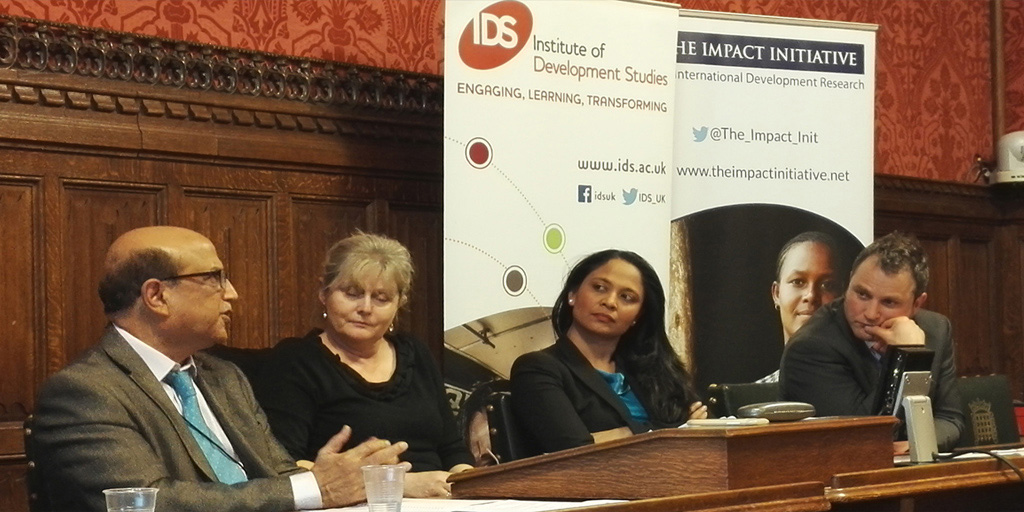
Bangladesh’ remarkable progress over the last 40 years in reducing poverty and improving lives can offer valuable lessons for achieving inclusive and sustainable development globally. Said Dr Mushtaque Chowdhury, Vice-Chair of BRAC, at an event in the Palace of Westminster hosted by the UK’s All Party Parliamentary Group for Bangladesh and the Institute of Development Studies (IDS).
Dr Chowdhury highlighted the vital contribution that the partnership between Bangladesh and the UK has made to Bangladesh graduating to lower middle-income status, reducing poverty, improving health services and education provision and modernising agriculture. Bangladesh has overtaken India in terms of human development progress.
Dr Chowdhury said, “Collaboration between Bangladesh and the UK has helped to increase our understanding of how to break the cycle of extreme poverty. This learning around what works could make a significant contribution to the reduction of poverty in all of its forms globally.”
Other Bangladeshi organisations attending the UK meeting to share their knowledge of development progress and lessons for the wider region include: The Bangladesh Institute for Governance and Development, BRAC University, the James P Grant School of Public Health at BRAC University, the global health research institute icddr,b and Bangladesh’s Institute for Development Studies.
Microinsurance for 5 million microfinance clients
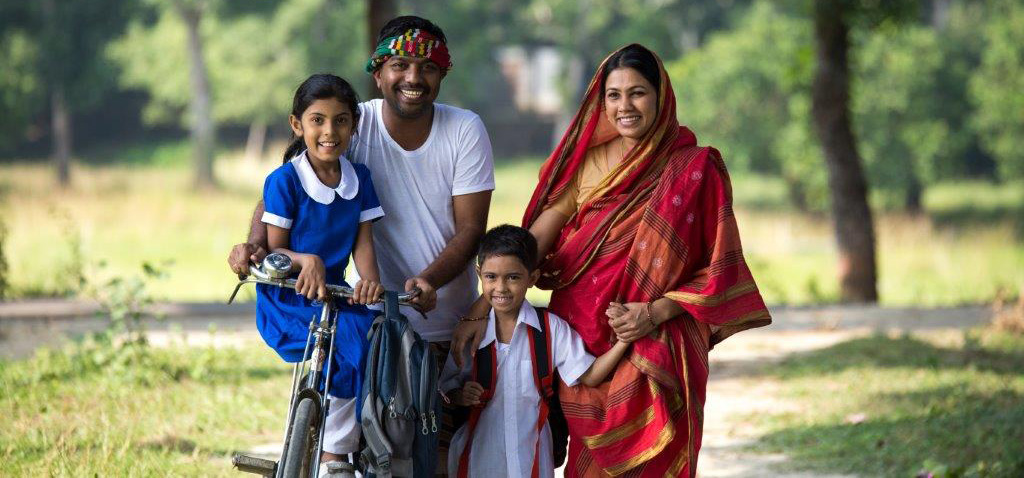 Introducing microinsurance for our microfinance clients
Introducing microinsurance for our microfinance clients
We have partnered with Guardian Life Insurance Limited to offer our first microinsurance product - credit shield insurance to our 5 million microfinance clients. The product is targeted towards the lower-income population of Bangladesh to protect them and their livelihoods in the event of death of a household member or the earner.
Our microfinance clients have been using credit and savings products to access opportunities, plan for the future, and cope with shocks. However, some events are hard to predict, and even harder to cope with.
Every year we experience more than 22,000 deaths of microfinance clients or earning members in their families.
For households that face this adversity, credit shield insurance fits in as an important safety net to provide an alternative to emergency strategies for protecting household finances and promote resilience.
When microinsurance was piloted a year ago, we learnt that insurance penetration is low due to negative preconceived perception towards it and lack of awareness. In Bangladesh, traditional insurance companies mainly focus on the upper and middle-income population leaving a large portion of the total population unserved. To fill that gap and best meet the needs of our clients and their families, credit shield insurance has been designed to be accessible, affordable, and easy to use.
Any of our microfinance clients can avail credit shield insurance when applying for their loan by making a minimal one-time premium payment set at 0.3 per cent of the loan amount for individual coverage or 0.7 per cent to cover dual members of a household. This insurance product comes with a cash benefit from BDT 10,000 (USD128) to BDT 20,000 (USD256) to cover the costs of funeral and other arrangements. Credit shield insurance also covers the remaining loan outstanding in full and allows savings to remain intact for the family to meet their emergencies.
To ensure hassle free, fast settlement of claims, only two documents of proof is required from the client end – the death certificate issued by doctor/local authority and a copy of National ID. Moreover, our dedicated team and customer service assistants are beside our clients to deal with queries and concerns every step of the way.
Commenting on the launch of credit shield insurance, Shameran Abed, director of BRAC’s microfinance and ultra poor programmes said, “Poor households are particularly vulnerable to sudden shocks, and nothing is more debilitating than losing an earning member of the family. With the launch of this product, we are taking one more step towards helping our borrowers become more resilient so that they can withstand such shocks.”
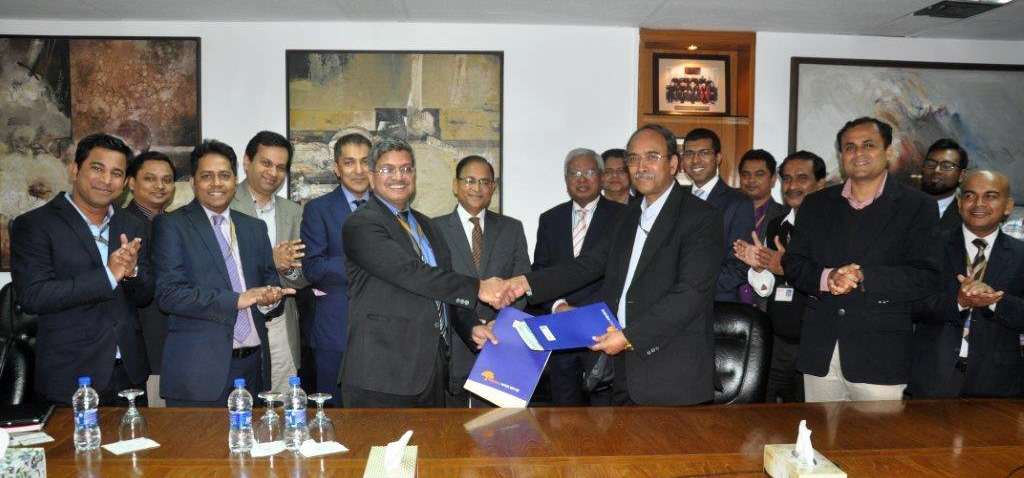
The service legal agreement (SLA) signing ceremony of BRAC and Guardian Life Insurance Limited was held at BRAC Centre on 12 January 2017. BRAC’s founder and chairperson, Sir Fazle Hasan Abed; executive director, Dr Mohammad Musa; senior director, Asif Saleh; director of microfinance and ultra poor programmes, Shameran Abed; chief executive officer of Guardian Life Insurance Limited, M M Monirul Alam, and managing director of Square Pharmaceuticals Limited were present at the ceremony.
About Guardian Life Insurance Limited
Guardian Life Insurance Limited (GLIL) started its business activities in 2014. It is the fastest growing life insurance company in Bangladesh. GLIL aims to provide the best insurance products and services to the people of Bangladesh. To know more about Guardian Life Insurance Limited, please visit http://www.guardianlife.com.bd/
BRAC provided 50 sewing machines to girl entrepreneurs in Tanzania
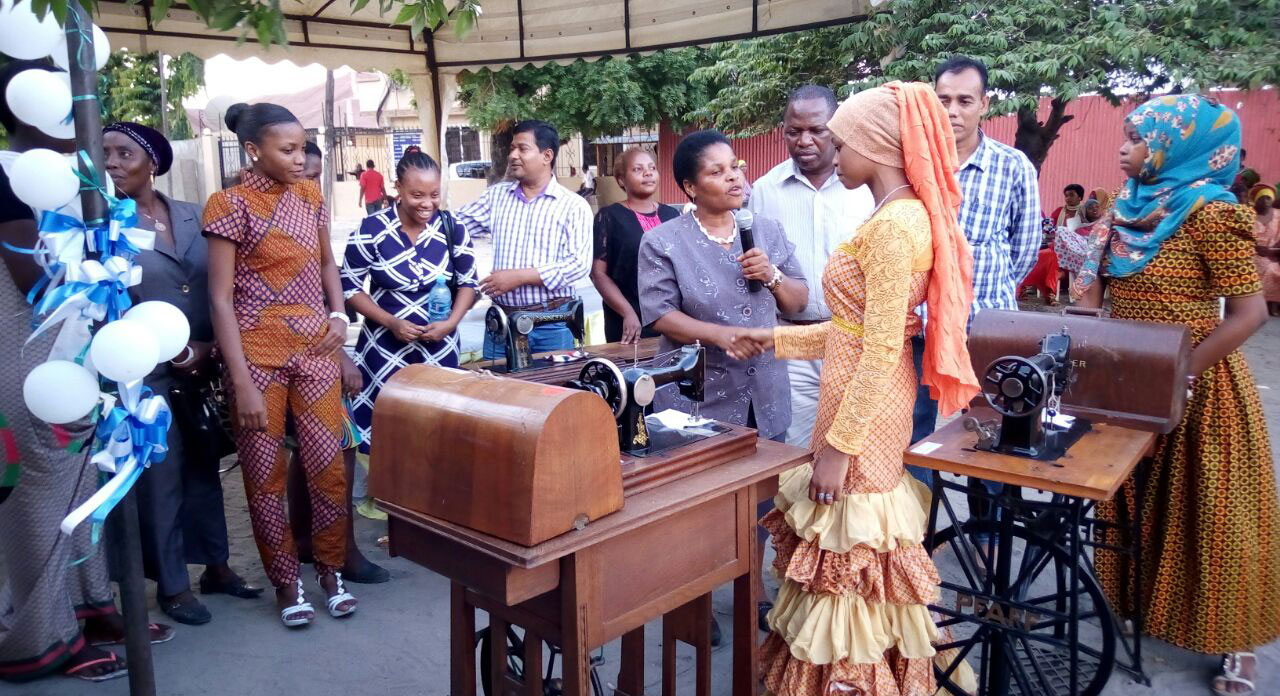
BRAC, through their Empowerment and Livelihood for Adolescent (ELA) project, has rolled out a plan to support 50 outstanding girls with sewing machines across four regions in Tanzania, namely Dar es salaam, Mbeya, Iringa and Dodoma.
The support was extended to girls who were trained by BRAC under the ELA initiative and demonstrated commitment to use their skills to empower more girls around their community.
The ceremony was attended by chief guest Ms. Anna Marika, a youth officer from Temeke Municipality where BRAC has established 10 girls clubs. Ms. Marika commended BRAC’s efforts to empower adolescent girls, and thanked the BRAC for supporting girls living in difficult environments. She encouraged the community to join hands in supporting girls’ initiatives since their economic liberation will be felt throughout the community, and how an empowered girl child is the best single investment any society should consider.
BRAC started the ELA project in 2013 to create safe space for girls in Tanzania where they can meet their peers and share experiences, challenges and discuss new ways to tackle them. BRAC is currently running 180 girls club in four regions namely Mbeya, Iringa, Dodoma and Dar es salaam.
The clubs provide adolescent girls the opportunity to learn new life skills which empower and support them to launch and implement their own business ideas. The girls are also given livelihoods skills in tailoring, hairdressing, and agriculture so they can choose a sector they are interested in. The ELA programme focuses on improving the quality of life of adolescents, especially vulnerable girls through two objectives of social education and financial empowerment.
The programme is designed to socially and financially empower vulnerable teenage girls aged between 11 to 19 years.
BRAC investing in mobile app Maya Apa
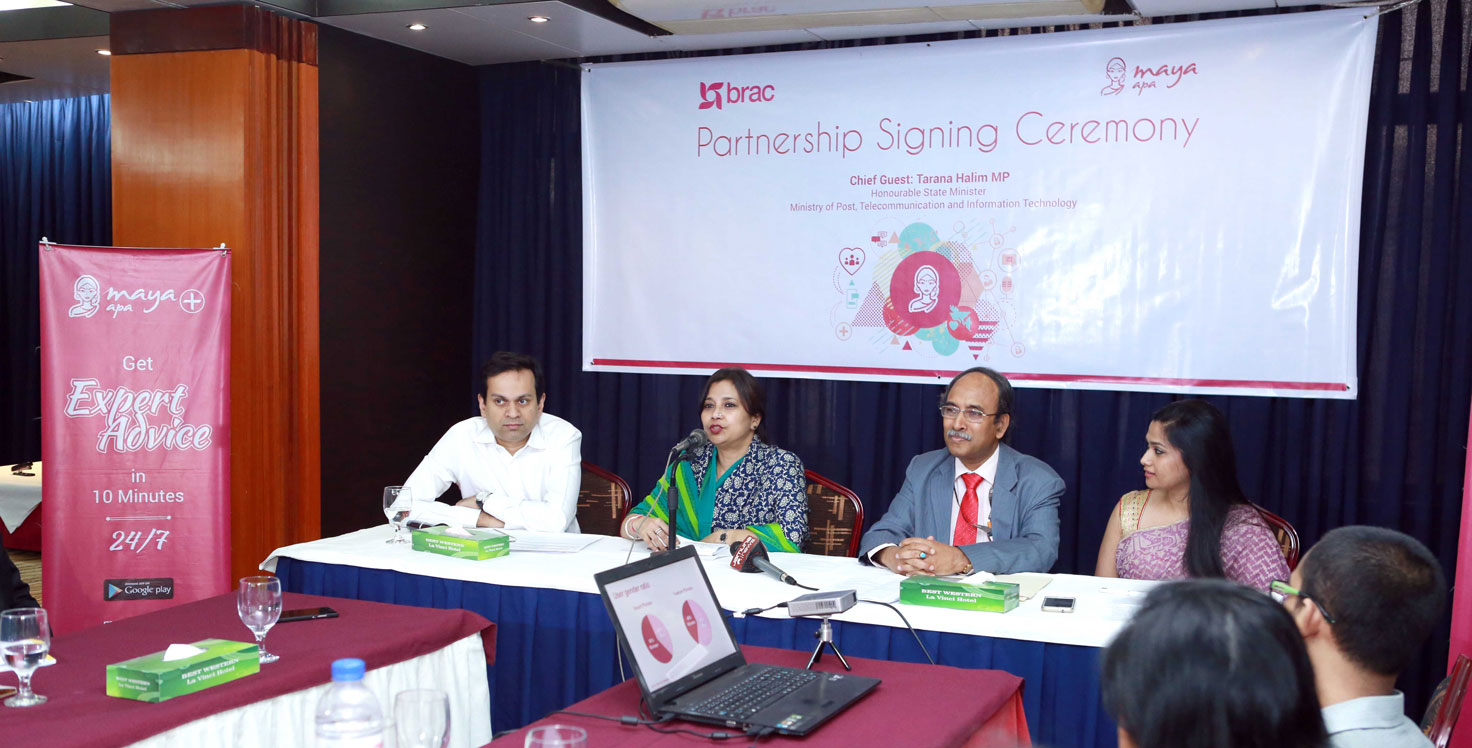
BRAC is going to scale up its investment in mobile app Maya Apa to ensure quality information and counselling service delivery for a greater number of people. Besides, BRAC’s urban development programme will implement a pilot project where Maya Apa app will be used to give services to 50,000 women garment factory workers.
This new BRAC-Maya initiative was announced today on Wednesday (February 15) with a signing ceremony organised at a hotel in the Dhaka city.
Maya Apa is a virtual platform that anyone anonymously can access any time for counselling and answers to queries on daily life issues including health, psychosocial and legal matters. Once the question is asked it is redirected to the profile of relevant experts and the answer appears within three hours maximum. Statistics show that since the app's launch in February 2015 around 150 thousand queries were received and answered. Currently, over 10,000 users access it daily.
Tarana Halim, state minister for posts and telecommunications, was present at the ceremony as the chief guest. Asif Saleh, senior director, strategy, communications and empowerment, BRAC, moderated the event while Dr Muhammad Musa, executive director, BRAC, briefed on the mission and objective of the partnership. Ivy H Russell, founder of Maya, spoke on the activities of Maya Apa. Dr Muhammad Musa and Ivy H Russell signed the agreement on behalf of their respective organisations.
‘Today's event is a stark example of how ICT in Development is the next frontier of sustainability. BRAC and Maya Apa partnership will help both organisations reach out to the millions in Bangladesh to provide wellbeing and healthcare at their fingertips’, said chief guest Tarana Halim. ‘I am very happy to be a part of this ceremony, especially seeing a women-led technology start-up like Maya Apa, pushing barriers to providing affordable healthcare and wellbeing, makes me proud. I would like to wish both BRAC and Maya Apa all the best for the future and hope that the telecom service providers come forward to help with services like Maya Apa’, she further said, adding, BTRC would always stand by such social initiatives.
The organisers said, they aim at connecting the people of Bangladesh to the current digital revolution of the world. Anyone with just a mobile number can access Maya Apa. They can email their queries also. As a result, the users can easily keep themselves anonymous. Till now 60 per cent of the users are women, while the rest 40 are men. The service is available through any Android-based smart phone, web or SMS. The initiative will enable BRAC-Maya group to reach information and counselling services to people both in the rural and urban areas. The service can be accessed through download of this link https://goo.gl/LTW2OA
Having briefed the context of this partnership agreement, BRAC executive director Dr Muhammad Musa said, 'Our objective is to provide better quality services to more people. By integrating technology into our programmes we want to expedite the delivery of BRAC’s services to the marginalised people.'
Maya founder Ivy H Russel said, 'The Maya Apa team and I could not be more thrilled to receive this kind of commitment from BRAC. Aside from the investment itself, BRAC brings unparalleled expertise and reach in taking services to “last mile” users. Our team will now have the resources in place to drive greater awareness for Maya Apa as well as invest more heavily in improving the service by developing our capabilities in machine learning, natural language processing, and mobile user experience.'
Relevantly, a service titled 'Maya Apa Plus' has already been launched under a partnership with mobile operator Robi. Users will have their queries answered in ten minutes through this service.
Join the world’s biggest family

